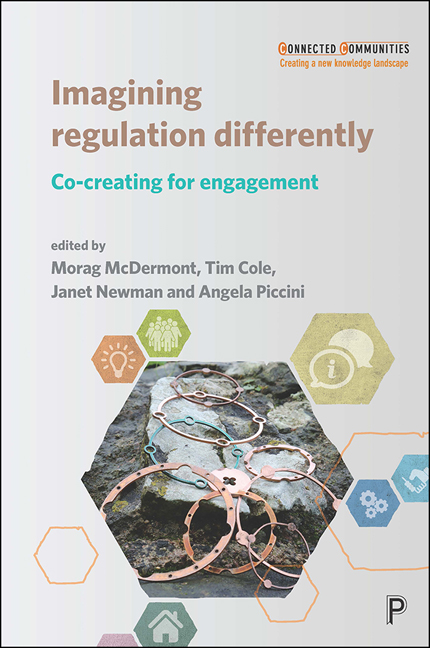Book contents
- Frontmatter
- Dedication
- Contents
- List of Figures, Tables and Boxes
- List of Abbreviations and Acronyms
- Notes on Contributors
- Acknowledgements
- Series Editors’ Foreword
- 1 Introduction: From the Regulation of Engagement to Regulating for Engagement
- 2 Co-Production as Experimentation: the Research Forum as Method
- Interlude: Community Researchers and Community Researcher Training
- 3 Beyond Prevent: Muslim Engagement in city Governance 49
- 4 Regulating for ‘care-ful’ knowledge Production: Researching Older People, Isolation and Loneliness
- 5 Who Gets to Decide what’s in my Fridge? Principles for Transforming the ‘Invisible Rules’ Shaping the Regulation of Food Habits in Urban Spaces
- 6 Life Chances: Thinking with art to Generate new Understandings of Low-Income Situations
- 7 The Making, Mapping and Mobilising in Merthyr Project: Young People, Research and arts Activisms in a Post-Industrial Place
- 8 Regulating Engagement Through Dissent
- 9 The role of Community Anchor Organisations in Regulating for Engagement in a Devolved Government Setting
- 10 Conclusion: Towards an Organic model of Regulating for Engagement
- Postscript: Engaging the University?
- References
- Index
9 - The role of Community Anchor Organisations in Regulating for Engagement in a Devolved Government Setting
Published online by Cambridge University Press: 03 March 2021
- Frontmatter
- Dedication
- Contents
- List of Figures, Tables and Boxes
- List of Abbreviations and Acronyms
- Notes on Contributors
- Acknowledgements
- Series Editors’ Foreword
- 1 Introduction: From the Regulation of Engagement to Regulating for Engagement
- 2 Co-Production as Experimentation: the Research Forum as Method
- Interlude: Community Researchers and Community Researcher Training
- 3 Beyond Prevent: Muslim Engagement in city Governance 49
- 4 Regulating for ‘care-ful’ knowledge Production: Researching Older People, Isolation and Loneliness
- 5 Who Gets to Decide what’s in my Fridge? Principles for Transforming the ‘Invisible Rules’ Shaping the Regulation of Food Habits in Urban Spaces
- 6 Life Chances: Thinking with art to Generate new Understandings of Low-Income Situations
- 7 The Making, Mapping and Mobilising in Merthyr Project: Young People, Research and arts Activisms in a Post-Industrial Place
- 8 Regulating Engagement Through Dissent
- 9 The role of Community Anchor Organisations in Regulating for Engagement in a Devolved Government Setting
- 10 Conclusion: Towards an Organic model of Regulating for Engagement
- Postscript: Engaging the University?
- References
- Index
Summary
Introduction
In Wales, devolution signified an opportunity for the Welsh government to do politics differently. In particular, there was a focus on public participation as a mechanism for improvements to the economy, social outcomes and public services (Welsh Government, 2004). In ambition, at least, the devolution experiment in Wales anticipated the development of regulations for the engagement of its citizens. This chapter considers the role of community anchor organisations in the ‘flagship’ regeneration programme of the National Assembly for Wales, ‘Communities First’, launched in 2001 and later terminated in March 2018. The programme started as a ‘bottomup’ initiative for engaging with disadvantaged communities at the margins, setting up regulatory structures to deliver that vision; became a reduced and more competitive programme from 2008/09, with more defined outcomes; and then entered its final phase in 2012, with ‘clusters’ of communities that were expected to deliver governmentdriven outcomes on health, learning and, in particular, employability through a system of results-based accountability (RBA). In the process, regulation for engagement shifted to regulatory structures and processes that controlled engagement: the regulation of engagement.
Other research has traced the evolution of the programme (Pearce, 2012; Dicks, 2014) in the context of a bold policy experiment in a devolved context while the programme was still live. This chapter, however, unpicks the story of its evolution and demise from the perspectives of community development advisors and community development practitioners, the latter based in two community organisations in South Wales: South Riverside Community Development Centre (SRCDC) in Cardiff and 3Gs Community Development Trust in Merthyr Tydfil. Both organisations were involved in the Productive Margins programme and in the design and analysis of this research. Both pre-existed the Communities First programme and were charged with its delivery to local people. We look at the regulatory context in which these organisations found themselves and how they negotiated the demands of the state-funded programme, on the one hand, and their accountabilities to the communities that they believed they represented, on the other. A key question remains as to whether the involvement of community organisations in state-funded programmes can facilitate regulation for engagement for social change or whether their power to improve the well-being of the communities they represent might better be served in providing alternative modes of living.
- Type
- Chapter
- Information
- Imagining Regulation DifferentlyCo-creating for Engagement, pp. 167 - 188Publisher: Bristol University PressPrint publication year: 2020

